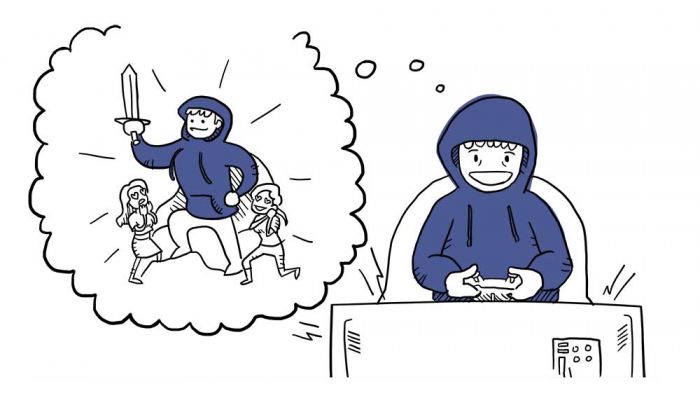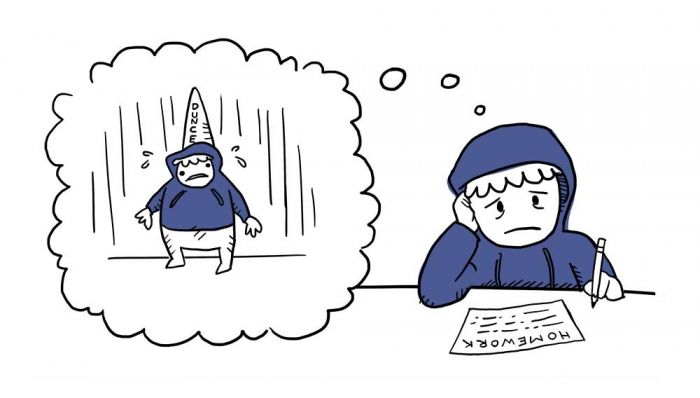Clues on Kids #001-B
In our first article we addressed how video games can hinder emotional connection with family and friends. Video games when left unchecked can rob a child of motivation to participate in everyday life by stimulating the brain in ways not otherwise achievable.
Today, let’s take a look at one specific feeling that kids get from playing video games: a wonderful feeling of POWER. This sense of power cannot be matched anywhere else in your kid’s real world.
Power? What do you mean Power? How do videogames make my kid powerful?
It’s not that they make your kid powerful. On the contrary, they are quite capable of robbing your child of his power. However, video games artfully offer the feeling and illusion of power, and that can be quite addictive. While these games are challenging and some are really hard to do, they are designed for the player to master it quickly. The dedicated gamer can succeed in his gaming world faster and easier than anywhere else in the real world. Additionally, there’s always another level or achievement to be conquered, so a player is never done. The game presents goals that seem challenging but are inevitably achievable creating a sense of triumph in tremendous frequency… much more than you can ever attain playing piano or hitting a baseball. Again, it is the easy rapid-fire quick wins over and over again from video games that devalue the desire to put in the weeks or months of practicing the same skill/drill/scale to achieve that incredible feeling of success.

I get that it can feel good to have that feeling of victory. But seriously! These games are all the same. How can my kid spend so much time with something so repetitive and meaningless?
Oh, they mean quite a bit to your kid. Think of it this way: Take a moment to imagine your all-time favorite book, movie, or sporting event. Remember it vividly in your head: the characters, the plot, the clever one-liners, the amazing winning point, etc. OK, now envision that you are not just watching or reading it… you are living it as the protagonist HERO! You are in control of everything and it all works out in your favor in the most exciting ways. When it doesn’t, you can always go back a little bit and live it again until events unfold how you see fit! How hard would it be for you to step away from that amazing fantasy world and go back to finishing the laundry or scrubbing the toilet? Maybe you can better see how it is not meaningless if you look at it from your kid’s point of view. She gets to live in a world where everything goes right, and she made it that way by making all the right choices. How often in her real world is she told that she did everything right for the day and made perfect choices, where she is free from judgment? How often, in her real world, does she get to go back and undo her mistakes without negative repercussions?
Growing up is challenging, and seldom are kids put in a position where they feel instantaneously victorious. That’s normal for the real world. This is precisely the reason why it’s so easy for your child to get lost in the fantasy of her video game. However, in the long run, you know this is a cop-out. That world she gets lost in is not authentic and the more time she spends in it, then the less time she spends learning how to be in the real world, relating to real events and real people in real ways.
When your child spends a significant amount of time each day gaming on her devices, she isn’t expanding or challenging her mind in any way that matters in her real life. It’s as if she’s on a perpetual vacation from dealing with all the normal frustrations that all of us real humans must learn to cope with on a daily basis. Too much videogame time stunts your child’s emotional development. Consequently, we risk the result of a world full of kids growing into adults who have had very limited practice dealing with reality.

Emotional development being stunted by videogames, huh? I can just hear him now, “But Mom, you wanted me to make friends! This is what my friends are doing!”
It is true that video games are taking up more and more of our kids’ lives than we’d like to see. As a result, gaming is becoming one of the most common ways that our kids are socializing with each other. While Joey has a long list of friends who are all playing the same game, they are not really connecting with each other in the way that matters the most. Video game conversations, as emphatic and passionate as they may appear to be, should not replace talking about real life stuff. Yet they are, because it’s a much safer and easier thing to do and emotions are easily avoided. However, not having frequent practice with conversations that involve depth and emotions is where the stunting of emotional development begins to happen. Let’s emphasize the word practice. With enough practice, you can become proficient at just about anything. Practicing DAILY how to live with and talk about various emotions is what is required for your child to get used to how all of his emotions work. This helps him understand how his emotions affect himself and others. Without this daily practice at home while they are young, where it is safe and less embarrassing to make mistakes, your child can develop into an adult with few skills to effectively and maturely communicate with others. How many of you know that guy at work who blows up at the littlest things? Or the woman in the next office that cannot stand up for herself and speak her mind? It probably wasn’t video games that created those traits, but there’s a likely chance it was the lack of practice during childhood to safely express their emotions that played a part in those deficient social skills.
Wait a minute! My kid NEVER has conversations about her emotions… she’s 10 for crying out loud.
Fair point. Kids and many adults for that matter are not going to process their feelings in every day conversation. However, having face-to-face interactions, resolving conflicts that inevitably arise between friends and sharing empathy with a fellow human takes practice. Kids have that opportunity while sitting across from each other playing a board game, or jamming together with very out of tune guitars, or shooting hoops together, or even just sitting in your child’s room trying to figure out what to do to relieve their boredom. In those situations, your kid can’t just mouth off insults anonymously or mute that person indefinitely when things don’t go her way. She has to make mistakes and learn to navigate socialization in the real world.
Online friends are disposable friends. One day your kid can feel incredibly connected to that other kid across the country because they both love Minecraft and the musical stylings of Twenty One Pilots. However, that relationship is easily and coldly tossed aside because there are no consequences for abandoning that friendship. At school, your daughter would have to see that former friend every day and deal with the social ramifications of being cruel to her. Online friendships can often be more superficial and anonymous, however your child doesn’t have the social acumen to tell the difference.
But what about all those games that promote creativity? Don’t they help kids be more imaginative and inventive when they are bored and don’t know what else to do?
Some parents think that video games are the perfect answer to preventing boredom. However, let’s remember that learning how to be bored and how to deal with boredom are two very valuable life skills to have. A child who spends very little time with nothing to do and filled with constant outside stimulus will lead to a child losing his creativity and stunt his development of his sense of self.
The American writer and philosopher, Robert Pirsig, once said, “Boredom always precedes a period of great creativity.” A child needs to be placed in a situation to just BE. That’s how creative thinkers keep creativity from becoming stagnant. Boredom allows your child’s mind to wander, to fantasize, to calculate plans, flesh out ideas, ponder about and challenge rules that make no sense and ask questions. Boredom helps him think about events from yesterday, which in turn helps him learn how to be wiser tomorrow.
So whether it’s a two-hour trip to Grandma’s or a 10-minute drive to school, let him be bored sometimes. What if your kid went to the grocery store with you and actually stared at the shelves instead of his iPad? See what kind of conversations can come out of it.
So are you trying to tell me that no one should ever play videogames? Will everyone get dragged into this delusional time-suck?
That answer is in the April 2017 Blog Entry: How Much Video Game Time Is Too Much? (Part 3) In this third installment we’ll talk about how to allow your kids to play video games with reasonable limits and using them to promote more cooperation.
(updated article from November 2007)
Remember that children are born to make mistakes… That’s how they learn.
Contact Us
Contact Us For More Information if you have more questions or would like more information, please contact our Clinical Director, Kent Toussaint at 818.697.8555.
